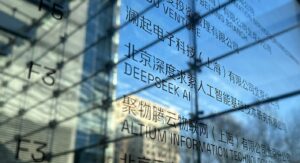Xi Emphasizes China’s Need to Conquer AI Chip Challenges

China’s Ambitions in AI Technology
Recently, President Xi Jinping emphasized the need for China to address the challenges associated with developing key artificial intelligence (AI) technologies. This includes the creation of advanced chips that are essential for high-performance AI applications. Xi’s comments, reported by state media, come as Beijing aims to solidify its status as a leading contender in the fast-evolving AI field.
Challenges Amid Trade Tensions
China’s pursuit of technological dominance is made more complex due to ongoing trade tensions with the United States. The trade dispute has resulted in substantial tariffs on goods exchanged between the two countries, with duties on many Chinese products exceeding 145%. In response, China has implemented tariffs as high as 125% on U.S. imports. These trade barriers could limit access to crucial technologies that China requires for its AI ambitions.
Xi’s Call for Research and Development
During a recent meeting of the Politburo, Xi called for a stronger focus on basic research and the need to overcome hurdles in key technology areas. He highlighted the importance of developing an independent AI ecosystem, which includes sophisticated chips and essential software. Xi’s push emphasizes both enhanced research and a policy framework supporting technology self-sufficiency.
The Rise of Generative AI in China
The introduction of generative AI applications, like ChatGPT in November 2022, has spurred a rapid increase in AI innovations within both the United States and China. Startups are emerging rapidly; for instance, the Chinese company DeepSeek entered the market with its R1 chatbot, reportedly matching the functionalities of its American counterparts while being more cost-effective.
Self-Reliance in AI Development
Despite these advances, Xi acknowledged that gaps still exist within the Chinese tech industry. Thus, achieving “self-reliance” in vital technology sectors is deemed critical. He outlined the necessity for political backing through various measures, including strong intellectual property protections, favorable taxation policies, public procurement strategies, and enhanced infrastructure accessibility.
Impact of U.S. Export Controls
Under both the Trump and Biden administrations, the U.S. has enacted restrictions on exports to China for advanced processors. These processors are crucial for developing sophisticated AI models, and companies like Nvidia and AMD have reported that these restrictions may severely impact their business operations. Nvidia’s CEO, Jensen Huang, expressed his willingness to deepen ties with the Chinese market while promoting U.S.-China trade cooperation.
Global Concerns About AI and Data Privacy
The global community has raised concerns regarding China’s AI initiatives, primarily focusing on how personal data will be handled. There is apprehension that such data could be accessed by Chinese authorities, which has led to discussions about data privacy and security in the context of AI development.
Future of AI in China
As China continues to invest in AI and technological advancement, the government’s strategies towards self-reliance and policy support will play a significant role in shaping the future of AI in the country. The ongoing competition with the United States and the need to address global concerns regarding data usage will be pivotal in determining China’s position as a leader in the AI sector.






